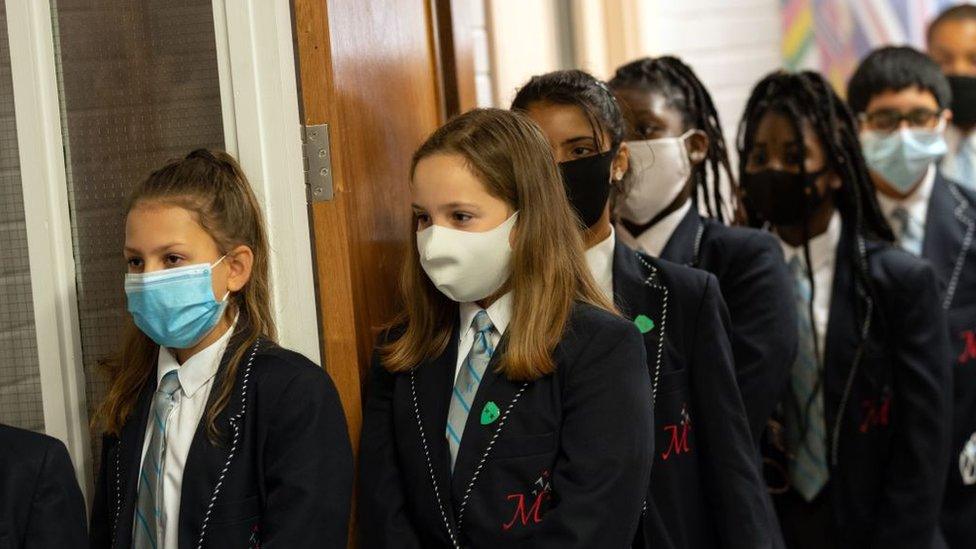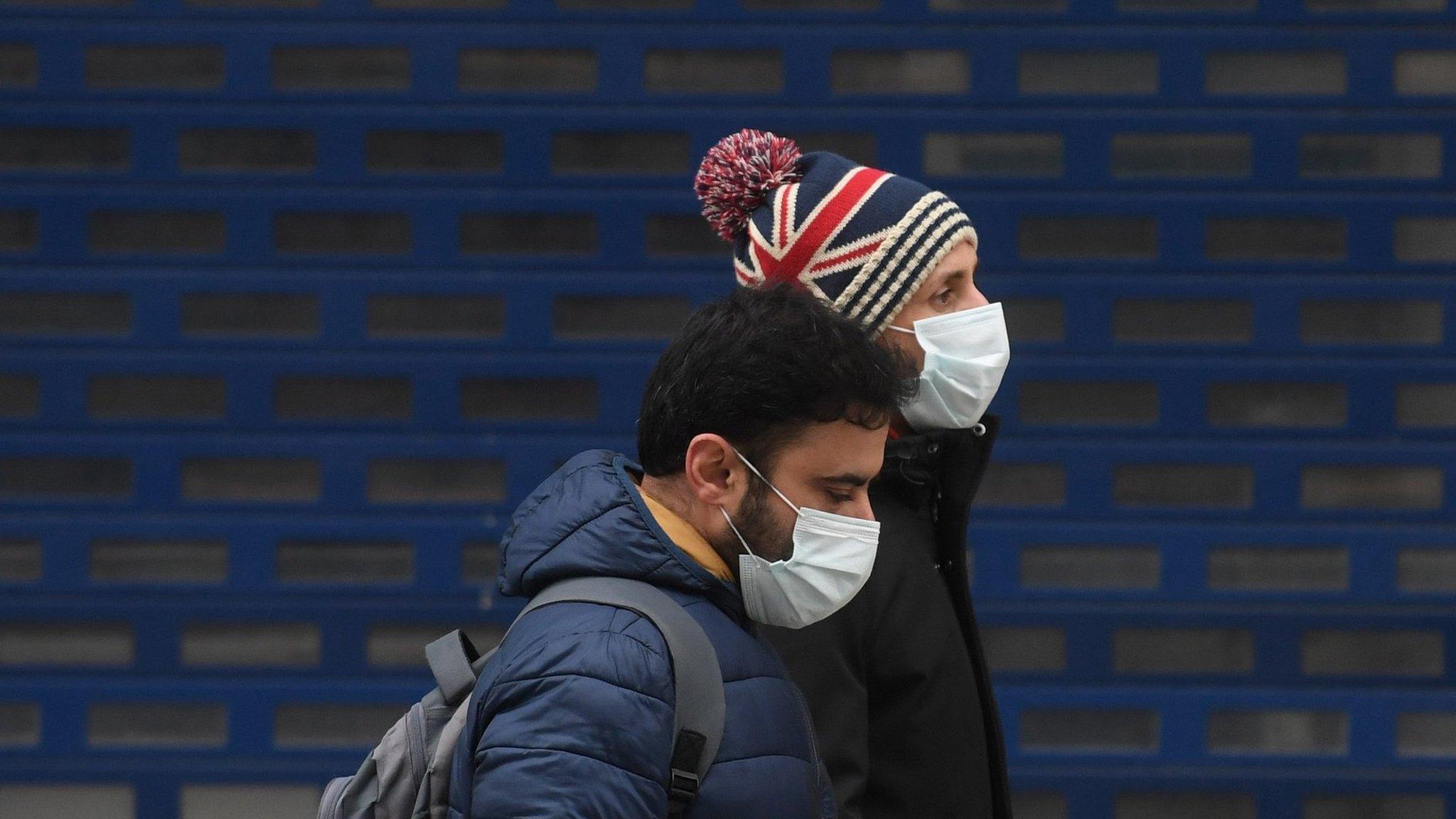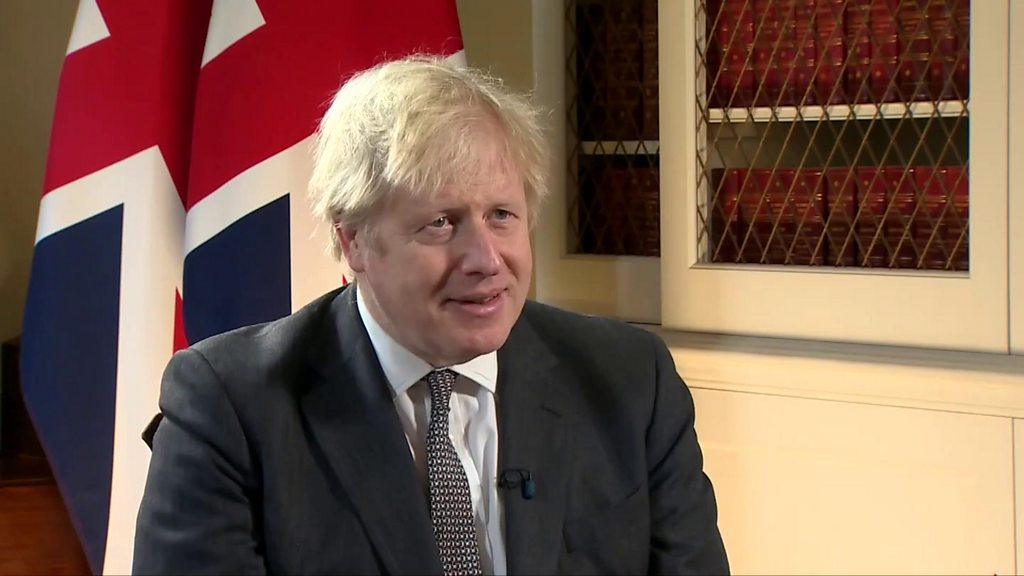Covid-19: School closures will be 'as short as possible'
- Published

There is "absolutely no reason" schools in England will not be ready to mass test pupils when they return next term, the education secretary has said.
Gavin Williamson said he wanted school closures to be as "short as possible" after delaying their reopening amid surging coronavirus cases.
It comes as people are being warned not to gather on New Year's Eve.
Some 20 million people in England have been told to "stay at home" after tier four was expanded at midnight.
They join the 24 million already in the toughest restrictions - meaning non-essential businesses must close, and people should stay home unless they have a "reasonable excuse".
On Thursday the UK recorded a further 55,892 new Covid cases, as well as 964 more deaths within 28 days of a positive test.
Defending the delay to term, Mr Williamson said the government was "battling this hidden enemy" - and that there was £78m of funding for schools to get testing up and running.
Equipment such as personal protective equipment (PPE) would be delivered next week and there would be support from the military.
But teaching unions said the move did not go far enough, and one labelled it "another last-minute mess".
Meanwhile an intensive care doctor has urged people not to gather ahead of the New Year and said those who do not follow social distancing rules or wear masks have "blood on their hands".

Prof Hugh Montgomery, professor of intensive care medicine at University College London, said: "It is making me actually very angry now that people are laying the blame on the virus, and it is not the virus, it is people, people are not washing their hands, they are not wearing their masks."
NHS England medical director Prof Stephen Powis said it was "absolutely vital" people stayed home and did not mix, saying "Covid loves a crowd". Health Secretary Matt Hancock said people must take "personal responsibility".
England's tier four restrictions mean people cannot meet other households indoors, unless they are part of a support bubble, while hospitality businesses and those such as hairdressers and nail bars must shut.
In Scotland, First Minister Nicola Sturgeon has said there should be "no gatherings, no house parties" for Hogmanay as all of the mainland remains in the highest level of restrictions.
A six-week lockdown began in Northern Ireland on 26 December, while Wales also has a national lockdown with people banned from visiting other households.

TESTING: How do I get a virus test?
LOOK-UP TOOL: How many cases in your area?
THE R NUMBER: What it means and why it matters

The warnings came after the UK announced the approval of a second vaccine for coronavirus, the Oxford-AstraZeneca jab, with the first doses due to be given on Monday.
The latest figures show 786,000 people have received the Pfizer-BioNTech Covid-19 vaccine between 8 December and 27 December, NHS England said.
GPs are to be offered £10 for every care home resident vaccinated and NHS staff will also be prioritised now that the Oxford jab has been approved, the health service said.
Deepti Gurdasani, epidemiologist and senior lecturer at Queen Mary University of London, told BBC Radio 5 Live there appeared to be a "bottleneck" in the delivery of the jabs with the volume of vaccines given was "six times lower" than the two million per week target.
A total of 232,169 people tested positive for Covid in England at least once in the week to 23 December, up 33% on the previous week and the highest weekly rise on record, the latest NHS Test and Trace figures show, external.
Covid case rates are continuing to rise in all regions of England - with London's rate at 735.5 per 100,000 people in the seven days to 27 December, up from 711.9 the previous week, the latest Public Health England (PHE) surveillance report showed.
Eastern England saw the second highest rate, 551.3 up from 510.8, followed by south-east England at 450.6, up from 427.4.
PHE medical director Dr Yvonne Doyle said Christmas week had seen a worrying rise in cases, adding "we must not now add further fuel on the fire" by meeting in groups for New Year's Eve.
Meanwhile, the NHS in London has been asked to make sure the London Nightingale hospital is "reactivated and ready to admit patients", an NHS spokesman said.

Mr Williamson announced on Wednesday that secondary schools across most of England are to remain closed for an extra two weeks for most pupils, to help regain control of coronavirus amid concerns about a fast-spreading new variant.
Some primary schools in Covid hot-spots, external will not reopen on Monday, he said, but the Department for Education confirmed on Thursday there would be a review every two weeks.
The education secretary told BBC Breakfast that remote learning would be "mandatory" from the week commencing 11 January for all secondary students, other than years 11 and 13 who would physically return to school on that date.


As soon as news emerged of the new faster-spreading variant questions began to be asked about schools.
An analysis by Public Health England released this week showed there was no evidence it was more able to infect children than other variants.
But that does not mean infection rates have not been rising among children.
As with all age groups, the proportion of school children testing positive increased during December - with more virus around, there was more transmission.
Primary school children however still remain one of the age groups with the lowest infection rates, according to Public Health England analysis of people who test positive.
This of course is likely to miss asymptomatic cases and random testing by the Office for National Statistics suggests infection levels could be higher.
Regardless of this, the sheer scale of the infection levels in the worst-hit areas means ministers wanted to buy themselves time, hence some primaries will remain closed.
If large numbers of pupils and staff need to isolate, it makes the smooth-running of schools impractical.
Ministers are hoping mass testing coupled with the tougher restrictions - three-quarters of England are now in the highest tier - will be enough to curb infection levels and keep a lid on the spread in schools.
But it is clear they will have to tread carefully to achieve that.

Mr Williamson said more than 85% of primary schools were reopening on Monday and he wanted any closures to be "short".
Meanwhile, council leaders said plans to close primary schools in 22 London boroughs but not in 10 others have "no logic".
A Department for Education spokesperson said decisions on which areas were affected by the changes to school reopening plans were based on the number of new infections, positivity rates and pressures on the NHS.
In Northern Ireland primary pupils will be taught remotely until 11 January while online learning will be in place for some post-primary pupils for the entirety of January.
Scotland has set a restart date of 18 January for face-to-face learning with the majority being taught online from 11 January, while in Wales pupils are due to return on a staggered basis.

HIS DARK MATERIALS: Fantasy drama for all the family
FILMS FOR EVERYONE: Check out what films are streaming now on BBC iPlayer

- Published30 December 2020

- Published30 December 2020
